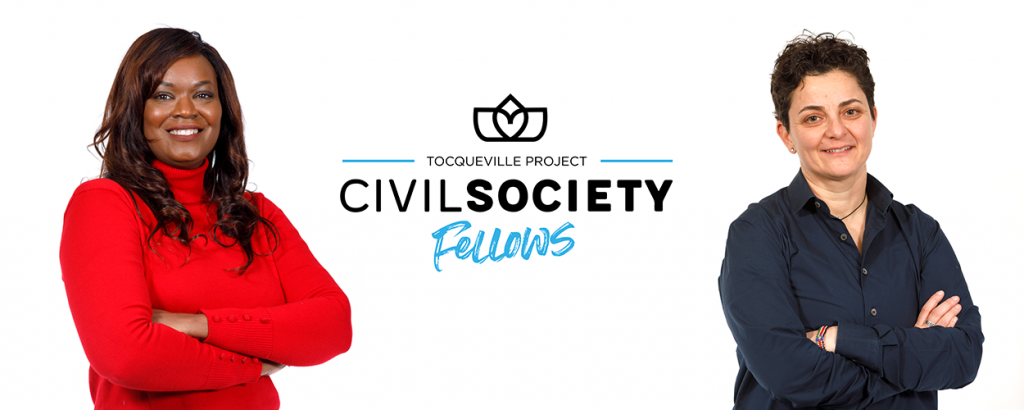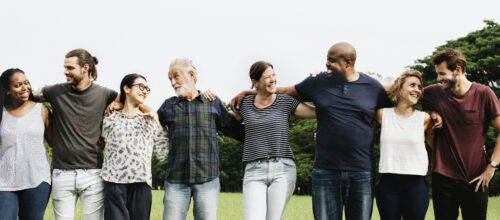Our nation thrives when diverse individuals come together to improve their communities. The new year is an important time to reflect upon the role of nonprofits—and civil society leaders—in strengthening communities and helping the disadvantaged.
With each new year, many Americans take time to reflect and then resolve to better themselves or improve their personal habits: eat healthier, exercise more, save money, or get a new job—the list goes on. If you are one of the 80 percent of people who are likely to fail at your New Year’s resolution, you know that breaking bad habits and creating new habits can be a difficult and frustrating endeavor.
Now imagine you grew up in an environment where your circumstances didn’t provide a role model in your family or community to help you build those core habits and virtues: the importance of self-respect, the value of self-discipline, and the rewards of honesty and personal responsibility. How much harder would it be to keep those New Year’s resolutions?
Unfortunately, too many Americans today grow up in families and neighborhoods struggling with poverty, violence, drug addiction, criminal activity, and other challenges. These circumstances often preclude one from learning those habits and behaviors that are essential building blocks, which form the foundation of a healthy and successful life.
Government aid and private aid
In search of a solution, some turn to government programs and social services. The Manhattan Institute’s civil society programs offer an alternative approach. Our goal is to recognize and advance the work nonprofit, nongovernmental organizations are doing to break the cycle of social challenges facing struggling communities and the next generation of Americans who hail from them.
Although there is a role for government in providing a social safety net—especially for people who are unable to support themselves—civil society organizations, with the help of private philanthropy and volunteers, can play a significant role in limiting the need for government programs by nurturing the formation of healthy social norms and behaviors.
As Howard Husock, director of the Manhattan Institute’s Tocqueville Project, writes in his recent book, Who Killed Civil Society, “Despite the massive scale and blanket coverage of the modern social service state, it fails to provide something essential that only civil society—operating independently from government revenue and its restraints—can offer: the modeling of habits and values that lay the foundation for upward social mobility and life as a contributor to one’s community.”
Norms and behaviors, not material goods, help people change the course of their lives, and they are not something the government can create. Simply the idea of the state “getting into the business” of character formation would be alarming. It’s a short step toward more extreme and oppressive examples, like Singapore, which in the past has not only banned chewing gum, but also urged men to marry women with advanced degrees.
Since its founding, the United States has been characterized by a strong and vibrant civil society in which citizens have come together to form voluntary associations and organizations that tackle some of our nation’s most serious public problems. And thankfully, we still have many inspiring leaders today, who are continuing to develop solutions to emerging needs and problems, transforming communities for the better and keeping our social fabric from fraying.
Leaders in civil society
Luma Mufleh is one of these people. Several years ago, while coaching a soccer team for refugee boys, Mufleh discovered the local, public school system was failing some of her players. One day after practice, Mufleh was helping a player with his homework, when she discovered the boy couldn’t read his assignment. He had been in the country for five years and was receiving As and Bs from his sixth-grade teacher—and yet he couldn’t read English.
After learning this failure was a pattern, Mufleh decided to open Fugees Family, Inc., which is a nonprofit and independent school network dedicated to educating refugee children. They have seen much progress with 6th – 12th graders located in Atlanta, Georgia, and Columbus, Ohio. Although only about 63 percent of English Language Learners graduate from high school, more than 90 percent of Fugees’ students are high school graduates.
Other examples include Sharpel Welch and her husband, Emmitt, who serve as positive role models and beacons of hope in their low-income and high-crime neighborhood in Shreveport, Louisiana. Through their work at Community Renewal International, they live in and run a “Friendship House,” which offers a safe place for people to come together and build relationships through after-school education programs, GED courses, art and music lessons, family nights, and much more. The Friendship House has made an immediate impact on youth education levels, and crime has fallen 60 percent in their neighborhood since 2001.
We all have different talents, and not everyone is destined to be a social entrepreneur. But what is at the heart of America’s long tradition of forming churches, voluntary associations, clubs, and other community groups is a desire to improve the world around us. This marriage of need and generosity—along with the unique freedom we enjoy to support causes we believe in—forms the bedrock of American civil society.
As we struggle to keep our New Year’s resolutions, perhaps the best way to improve ourselves is to strengthen our own communities by supporting those who need it most. By giving our time, talents, and hard-earned dollars, we can invest in and become part of these organizations that empower the poor and disadvantaged, build caring relationships to support those in crisis, prepare the next generation to realize their full potential, restore and revitalize struggling neighborhoods—and so much more toward building a flourishing American society.
Annie Dwyer is the director of the Civil Society Fellows Program at the Manhattan Institute.




